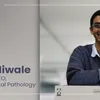This healthtech startup helps patients understand prescriptions, lets doctors predict cardiovascular disease risk
Medtech startup SiCureMi has developed KYP, which helps patients understand prescriptions better. Its non-invasive screening tool also helps doctors predict the risk of cardiovascular disease.
In January 2021, Tarun Gupta was at the AIIMS ophthalmology department to meet a doctor regarding a new product, a non-invasive retina screening tool to check for cardiovascular risk, when he got talking with a man who was accompanying his 8-year-old son.
“He and his son had come to Rajendra Prasad Eye Centre, AIIMS, three months back for a checkup. The doctor prescribed a topical medicine (eye drops) for his son, but he couldn’t clarify the dosage. Instead of taking the medicine once a night for 15 days, he ended up giving his child the medication for three months,” Tarun says.
The strong medicine led to irreversible damage to the boy’s cornea resulting in improper vision – an impairment that could have been avoided. Tarun, who comes from a family of doctors, realised then that there was a massive gap in understanding doctors’ prescriptions among patients and their caretakers.
The demand led him, along with his colleague Prakash Thakur, to launch healthtech startup Healthcare Technologies in late 2018 to “improve health outcomes and enhance healthcare delivery”.
“Existing players are trying to help patients get access to doctors which is the need of the hour, but this gap in the healthcare system remains unaddressed,” says Tarun, Founder and CEO, SiCureMi Healthcare Technologies.
“Patients are unaware of the language used in prescriptions; they don't know OD (daily) or BD (twice a day), with water or without water, etc. Many old people end up taking medicines in the morning if they miss it at night – that can be dangerous,” he adds.
Tarun started his healthtech startup at the end of 2018, started working on the screening product in early 2019, and initiated the KYP product in 2021.

Tarun Gupta with the KYP scanner
SiCureMi’s solution: KYP
Launched in March 2021, Know Your Prescription (KYP) is a patient-centric product that explains the prescription and addresses general, treatment-related queries in English, Hindi, Punjabi, Bengali, and Malayalam.
KYP helps generate clarity around medical prescriptions. All a patient needs to do is visit the AI-enabled portal(QR code), which directs them to a WhatsApp number after due diligence. They are connected with pharmacists or retired medical professionals to gain a thorough understanding of what their prescription means. This helps minimise medication errors and provide enhanced patient compliance and adherence.
The product is specially designed keeping the general population in mind, and the startup is eyeing a pan-India audience “with a major focus on Tier II and III cities”.
Tarun says: “Patients taking multiple medications often miss out on their doses. Experts will guide on what to do in such cases. Patients with co-morbidities often consume other medications, and need guidance on the side effects of combining medications. Help on the consumption of food items along with the medicines is also offered.”
“Research shows an alarming number of fatalities are caused by medication errors. Many patients are unable to ask questions due to a lack of knowledge or a time crunch. We address this by offering consults over WhatsApp to make patients more aware of their prescriptions to ensure better medical outcomes.”
Predicting risk of cardiac disease
The IIT Delhi (FITT) incubated startup has also designed an early diagnostic and AI and ML-based prevention screening tool to assess and manage chronic health conditions.
These include cardiovascular disease (CVD), the leading cause of mortality worldwide, which has traditional risk factors such as hypertension, kidney disease, elevated levels of total cholesterol, and blood sugar.
However, traditional risk factors are insufficient to predict all CVD events. Changes in retinal microvasculature can give better insights, and SiCureMi has built an algorithm-based method to interpret risk scores. Ophthalmologists, cardiologists, and other relevant clinicians can use this risk assessment tool to identifying the early signs of potential risk.
“Our proprietary technology presents an innovative and novel approach for early diagnosis and prediction of CVD risk. It’s far more accurate, superior in usage, and more affordable,” Tarun claims.
A large number of de-identified patients’ retinal images and clinical data were used to develop AI tools to accurately predict cardiovascular events.
“We have used a non-invasive, high-resolution, depth-resolved technique that can visualise retinal and choroidal vasculatures,” the founder says. “The risk profile for cardiovascular disease can be generated for individuals using these algorithms and non-invasive images of the retina.”
Currently, the startup is working only on Coronary Artery Disease (CAD). Later, they plan to focus on diabetes and kidney-related diseases.

Image Credits: YS Design Team
The validation and business model
Tarun says the product is in “the final stage of clinical validation” where a minimum viable product has already been built and tested upon, and claims they will be “market-ready in the next six months”.
“We’ve initiated talks to partner with three major eye care chains. Apart from eye care centres, we plan to partner and build an association with imaging technology manufacturers, cardiology hospitals, and insurance companies who will use our proprietary licence-based SaaS platform to add value to their customers,” Tarun says.
The Delhi-based startup, with a team size of 12, has also signed a three-year contract with Centre for Sight, which is one of the largest chains in India with more than 47 centres.
The healthcare startup works on the B2C model and charges Rs 30 per prescription.
It plans to launch an app soon, which will be used by patients to put forth their queries; it will also onboard eligible pharmacists and doctors to help patients.
KYP has more than 5,000 unique paid customers as of now. SiCureMi plans to launch a yearly subscription model of Rs 299 by Diwali. This will allow users to upload prescriptions unlimited times.
“We are also going to provide a three-year locker facility where the patient can store his/her prescription for three years in the app.”
The founder says its preventive diagnostic tool for CVD will generate a B2B medical SaaS-based revenue stream from multiple stakeholders in the chronic disease management space.
Funding and the road ahead
SiCureMi has so far raised $450,000 in pre-seed funding through grants from pharmaceutical companies, including Pfizer India, Sanofi India, government institutions like IIT-Delhi, BIRAC (DBT_GOI), equity investment from C-Camp and few angel investors, strategic investment from the insurance company COPIC & Microsoft global, and VC firm RightSide Capital.
Dr YK Gupta, ex-AIIMS Dean and former Head of the Department of Pharmacology, says, “Medical science is heading into an interesting era. MRI and CT scans will soon be a thing of the past. Startups like SiCureMi are heavily incorporating AI and machine learning in designing diagnostic tools. KYP will empower patients and help them make informed decisions regarding medications, and reduce dependency on the heavily pressed healthcare system.”
Tarun says the team wants to be part of the value chain, keeping the patient at the core and ensuring that treatment, delivery, and outcome are top priority.
“We want to be India-centric for a long time. We want to be a part of the backbone and support the integrated digital health infrastructure of the country as propagated by Ayushman Bharat Digital Mission (ABDM),” Tarun says.
YourStory’s flagship startup-tech and leadership conference will return virtually for its 13th edition on October 25-30, 2021. Sign up for updates on TechSparks or to express your interest in partnerships and speaker opportunities here.
For more on TechSparks 2021, click here.
Edited by Teja Lele









